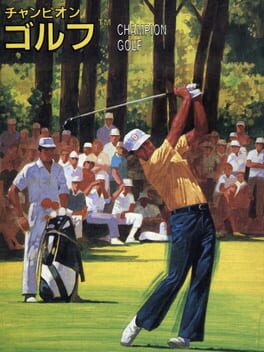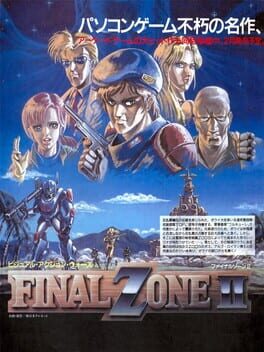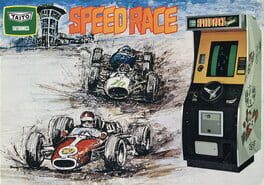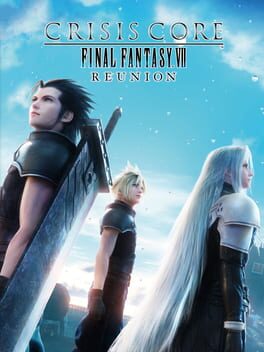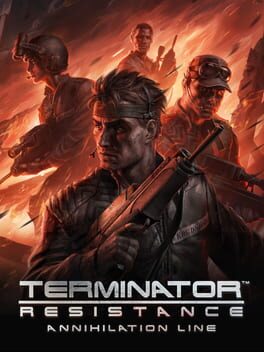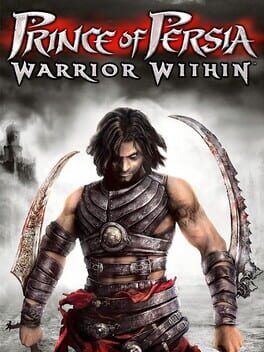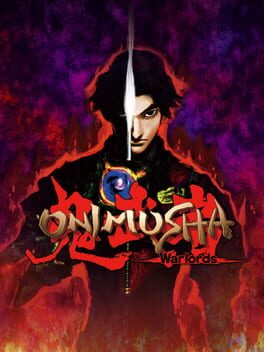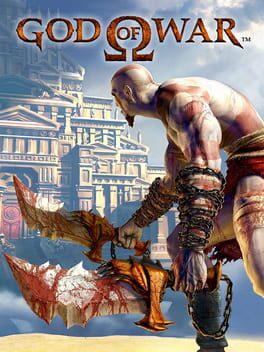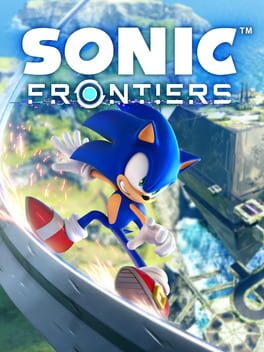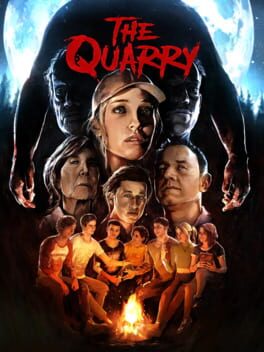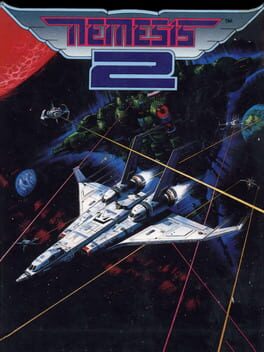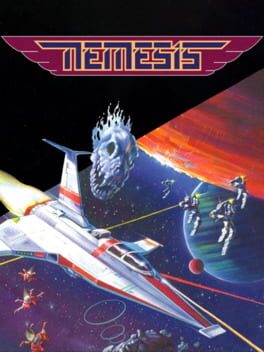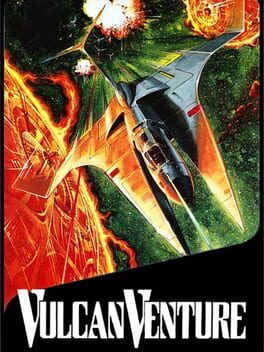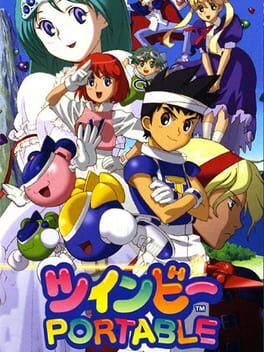Bottle
1983
Let down by its interface, making the whole affair feel imprecise and not much fun. It came out before the genre would be defined, so its faults are acceptable I guess, but there is a reason the genre to this day takes cues from Nintendo's Golf which was released a year later and not this. I'm sure it was fine in 1983, but don't bother now unless you're curious about SEGA's early console offerings.
1990
2023
Better than the original in some respects, and worse in others; The most important thing is that unlike RE 3 Remake (and to a lesser extent RE2 Remake as well) it feels like a complete product, standing alongside the original in terms of quality and content. This game didn't need to exist, and the remake isn't countering that claim, but what it does provide is a stunning tribute to the original classic, and stands as one of the best Resident Evil experiences out there. A must-play, even for the skeptics.
1974
While I was in Japan I had the opportunity to play Taito's Speed Race from 1974, which I believe was the first game to have smooth scrolling. It was actually a lot of fun and way more interesting to play than it had any right to be. I would choose this 1 million times over Pong.
It's interesting how many of the arcade racing fundamentals started here, with a toggle for high and low gear, as well as a timer that refreshed at checkpoint intervals.
As you'd expect from a game of this vintage, there is no goal. It's just a straight Hi-score run. Harder than it looks though, as the road often narrows or goes pitch black during certain sequences. I'm not 100% certain but I'd imagine it's impossible to emulate due to the hardware so tracking it down and playing it for yourself is the only way to play it. That's if you ever wanted to find one, this is pretty much just a curiosity piece these days.
It's interesting how many of the arcade racing fundamentals started here, with a toggle for high and low gear, as well as a timer that refreshed at checkpoint intervals.
As you'd expect from a game of this vintage, there is no goal. It's just a straight Hi-score run. Harder than it looks though, as the road often narrows or goes pitch black during certain sequences. I'm not 100% certain but I'd imagine it's impossible to emulate due to the hardware so tracking it down and playing it for yourself is the only way to play it. That's if you ever wanted to find one, this is pretty much just a curiosity piece these days.
It's easily the definitive way to play Crisis Core, but it's a shame the original with its PS2-era aesthetic and voiceover will more than likely be forgotten as a consequence. I don't mean to be dour though, as Crisis Core is an extremely fun time, and is the perfect length for what it's trying to accomplish. (more 15-hour-ish RPGs please, not everything has to be 1 million hours long...)
Can we please get Dirge of Cerberus next? Don't be cowards SE, I need my GACKT fix.
Can we please get Dirge of Cerberus next? Don't be cowards SE, I need my GACKT fix.
Annihilation Line, like the base game is a solid, if limited Terminator experience, unfortunately let down by a lack of variety.
The open areas are easily the best part, Terminator is a really good setting for a horror experience, and carefully making your way through Skynet patrols is genuinely a daunting experience, especially early on when you don't have many options to fight back. The linear sections are a mixed bag, and unfortunately expose the A. I's shortcomings as they stand and wait to be shot. It's hard not to see them as glorified shooting galleries, as they lack any of the tension exemplified by the open area levels. There are some cool moments but they're not going to set the world on fire, especially at this budget.
With all that being said, Resistance is still a fun time and it's clear that Teyon has a lot of love for the brand. I don't understand how this and the base game were so critically panned when there are far worse games being released from much bigger companies that review better.
The open areas are easily the best part, Terminator is a really good setting for a horror experience, and carefully making your way through Skynet patrols is genuinely a daunting experience, especially early on when you don't have many options to fight back. The linear sections are a mixed bag, and unfortunately expose the A. I's shortcomings as they stand and wait to be shot. It's hard not to see them as glorified shooting galleries, as they lack any of the tension exemplified by the open area levels. There are some cool moments but they're not going to set the world on fire, especially at this budget.
With all that being said, Resistance is still a fun time and it's clear that Teyon has a lot of love for the brand. I don't understand how this and the base game were so critically panned when there are far worse games being released from much bigger companies that review better.
While the mid-00s era aesthetics may seem hokey in 2022, It definitely worked as I had a friend who was obsessed with this game back in the day. Not obsessed with Prince of Persia mind you, but specifically this game; I think Shahdee must've awoken something in him. Despite this obsession being my first notice of the franchise, for some reason it was the only Ubi-era PoP game I never played, so I'm glad I finally got it off my backlog.
That being said, aside from the obvious aesthetic shift, this is still a PoP game which means it's mostly platforming albeit with an increased focus on combat this time around. It's good fun although I can't help but feel the rewind power was more so compensation for some pretty unfair design (the muddy visuals certainly don't allow for much clarity of your surroundings). When it works its a lot of fun but the open-design means you'll be repeating sections more than you like; a saw-trap puzzle isn't exactly exciting gameplay when you've done it 5 or more times.
Repetition really is this game's biggest weakness, apparently Sands of Time's short length was something the developers saw as a negative, and I feel they overcorrected. you could easily shave off about 20-30% of this game and you would get a much more focused experience. The last third is especially egregious, it's cool in theory but at that point, you've seen everything the game has to offer.
It's a lesser game than its predecessor and a clear example of how more game doesn't equal a better game, but that doesn't make it bad at all - it's just okay.
That being said, aside from the obvious aesthetic shift, this is still a PoP game which means it's mostly platforming albeit with an increased focus on combat this time around. It's good fun although I can't help but feel the rewind power was more so compensation for some pretty unfair design (the muddy visuals certainly don't allow for much clarity of your surroundings). When it works its a lot of fun but the open-design means you'll be repeating sections more than you like; a saw-trap puzzle isn't exactly exciting gameplay when you've done it 5 or more times.
Repetition really is this game's biggest weakness, apparently Sands of Time's short length was something the developers saw as a negative, and I feel they overcorrected. you could easily shave off about 20-30% of this game and you would get a much more focused experience. The last third is especially egregious, it's cool in theory but at that point, you've seen everything the game has to offer.
It's a lesser game than its predecessor and a clear example of how more game doesn't equal a better game, but that doesn't make it bad at all - it's just okay.
2019
I think this series' relative obscurity now is less a mark on its age and more a testament to the frankly absurd amount of quality releases, not just from Capcom, but from a lot of developers during the 6th generation of consoles.
It's a short one, and on the easier side if you're used to the fixed-camera Capcom games of the era, but it's still a lot of fun while it lasts and is worth playing if you want something that sits somewhere in the middle of Resident Evil survival horror and Devil May Cry stylish action. There is one section that is just cruel (if you know you know), but honestly, in an era where you can just look it up in two seconds, it's hardly worth getting upset over.
It's a shame this didn't sell well enough to justify porting the rest of the series over to modern platforms, but at least we got something (which is more than I can say for most companies regarding their legacy output...).
It's a short one, and on the easier side if you're used to the fixed-camera Capcom games of the era, but it's still a lot of fun while it lasts and is worth playing if you want something that sits somewhere in the middle of Resident Evil survival horror and Devil May Cry stylish action. There is one section that is just cruel (if you know you know), but honestly, in an era where you can just look it up in two seconds, it's hardly worth getting upset over.
It's a shame this didn't sell well enough to justify porting the rest of the series over to modern platforms, but at least we got something (which is more than I can say for most companies regarding their legacy output...).
2005
God of War is a video game. A very good video game.
God of War has always put its cinematic ambitions at the forefront, and in that area, the modern iterations of the series are better. But as a game, a title I can pick up and play with my own two hands, this is 100% my preferred choice. It's not only infinitely replayable but it respects my time. No forced walking segments, no taking the control out of my hands, this is a video game in the strictest sense of the word. The game even includes a bonus menu to die for. Game development ideas, beta and test footage, cut enemies, and story concepts; the game is exposed in such detail that you can't help but respect the immense work put in by Santa Monica Studio. God of War is clearly a labor of love, a collaborative effort that is honest about itself, and the team that made it.
I really don't want to put down the newer titles, but these classic games fulfilled a niche that is, unfortunately, lacking in the modern AAA space. It's not perfect by any means, but it's a video game that's not ashamed to be one, and I respect that.
God of War has always put its cinematic ambitions at the forefront, and in that area, the modern iterations of the series are better. But as a game, a title I can pick up and play with my own two hands, this is 100% my preferred choice. It's not only infinitely replayable but it respects my time. No forced walking segments, no taking the control out of my hands, this is a video game in the strictest sense of the word. The game even includes a bonus menu to die for. Game development ideas, beta and test footage, cut enemies, and story concepts; the game is exposed in such detail that you can't help but respect the immense work put in by Santa Monica Studio. God of War is clearly a labor of love, a collaborative effort that is honest about itself, and the team that made it.
I really don't want to put down the newer titles, but these classic games fulfilled a niche that is, unfortunately, lacking in the modern AAA space. It's not perfect by any means, but it's a video game that's not ashamed to be one, and I respect that.
2022
It's not perfect, but for the first time in years I'm actually hopeful for the future of the franchise, and I immensely respect what this game is trying to achieve. The writing alone makes it abundantly clear that the damage made by Pontac and Graff isn't irreparable. SEGA may not deserve Ian Flynn, but I'm so glad he's here.
2022
1987
MSX games seemed destined to be forgotten which is a shame because this is a completely original Gradius experience, with hidden bonus stages, an expanded upgrade system, and even somewhat of a story. The lack of smooth scrolling is an unfortunate reality of the system and having to play through the game twice to get the final boss is just classic '80s padding but it's still a fun time. I'd say it's worth playing if you really want to try every Gradius out there.
1990
A smart Game Boy conversion from developers that understood the hardware, and built the game around it. The limitations are evident but are accounted for, with a config menu that allows you to play the game how you'd like, giving it surprising scalability now that you don't have to play it on the Game Boy's crummy screen. This stands alongside the other Gradius games rather than being a watered-down handheld substitute like so many other games on the platform.
1988
Although it plays more like a remix of Gradius and Salamander rather than a true sequel, it iterates on itself just enough to become the best of the three. It still has its moments of unfairness, especially toward the end, but there are more chances to recover than in the last two games which is definitely a welcome change. Overall, just a really solid 80s shmup.
2007
